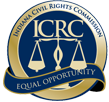Alternative Dispute Resolution (ADR) – Various methods of settling complaints during or after the commencement of a full investigation and determination of cause. ADR can include mediation (a formal conference utilizing a neutral, third-party mediator), conciliation (less formal discussions of the parties’ interests and willingness to resolve a complaint), or settlement discussions (the least formal form of ADR whereby the facilitator simply transmits offers and counter-offers between willing parties) and is a favored method for resolving complaints as parties can control outcomes and ICRC can preserve resources.
Comparator – A person who is “similarly-situated” to the Complainant but of another “protected class” (i.e., race, religion, sex). In cases of disparate treatment, a comparator is identified as evidence Respondent has treated persons of a different “class” more favorably than otherwise similarly-situated persons.
Complainant – A generic term used to describe the party alleging a discriminatory practice; "Complainant" means a person, including the Commission, who files a complaint.
Disability – “A physical or mental impairment that substantially limits at least one of the major life activities of the individual.” IC 22-9-5-6(a)(1). The term is defined more broadly under federal law and includes, but is not limited to including an impairment of a major bodily function (i.e., reproductive system, endocrine system).
Disparate Impact – A type of discrimination claim where an otherwise facially neutral policy has a disproportionally adverse effect on a particular protected class relative to individuals who are not members of that protected class.
Disparate Treatment – The most common type of discrimination claim. This type of claim involves one person (e.g., the Complainant) alleging they have been treated less favorably than a similarly-situated person of a different protected class.
Jurisdiction – Term used to describe the subject matter over which ICRC has legal authority. ICRC has legal authority to investigate complaints alleging discrimination on the basis of race, color, national origin, ancestry, sex, disability, religion, veteran status*, active duty in the military*, and familial status* in the areas of employment, real estate, public accommodations, credit, and education. ICRC may also accept complaints alleging retaliation for having previously filed a complaint of discrimination with ICRC. ICRC may only investigate complaints filed within 180 days of the alleged discriminatory act (one year for housing cases). (* in limited circumstances)
No Probable Cause – Under the Indiana Civil Rights Law, a legal determination made by the Executive or Deputy Director finding, based on the totality of the known circumstances, there is not a fair probability an unlawful discriminatory practice occurred. This is the opposite of a Probable Cause finding.
No Reasonable Cause – Under the Fair Housing Act, a legal determination made by the Executive or Deputy Director finding there is a lack of facts sufficient for a reasonable person to believe an unlawful discriminatory practice occurred. This is the opposite of Reasonable Cause finding.
Pretext – A false reason or motive given to hide the actual or real reason for an action.
Probable Cause – Under the Indiana Civil Rights Law, a legal determination made by the Executive or Deputy Director finding, based on the totality of the known circumstances, there is a fair probability an unlawful discriminatory practice occurred. See 910 IAC 1-1.5-14. If such facts are found, a full evidentiary hearing must be held before an ALJ or the Commission to determine whether the Civil Rights Law has been violated.
Protected Class or Protected Status – A class of people who benefit from protection by statute, such as the Indiana Civil Rights Law which prohibits discrimination on the basis of race, color, national origin, ancestry, religion, sex, veteran status*, active duty in the military*, disability, age (not enforced by ICRC) and familial status (with respect to housing claims under the Indiana Fair Housing Act). (* in limited circumstances
Public Accommodation – An establishment that offers its goods or services to the general public.
Reasonable Accommodation – Changes necessary to afford a person equal opportunity in employment, housing, education, and public accommodation. The Indiana Civil Rights Law and Fair Housing Act require employers, housing providers, educational institutions, and public accommodations to allow reasonable flexibility in policies when necessary.
Reasonable Cause – Under the Fair Housing Act, a legal determination made by the Executive or Deputy Director finding, based on the totality of the known circumstances, facts exists sufficient for a reasonable person to believe an unlawful discriminatory practice occurred. See 910 IAC 2-6-6(a). If such facts are found, a full evidentiary hearing must be held before an ALJ or the Commission to determine whether the Fair Housing Act has been violated.
Reasonable Modification – A necessary change to the physical structure of a domicile that permits equal access to a person with a disability. Such reasonable changes are required by the FHA.
Respondent – Any person against whom a complaint has been filed.
Similarly-Situated – An individual who is in substantially the same position as Complainant for purposes of comparing treatment. In the context of employment, this would mean a coworker who performed substantially the same type of job or committed a similar infraction. Similarly, in the context of housing, this might be a person who has the same qualifications for rental as Complainant (i.e., same income, same rental history, applying for same size unit)
